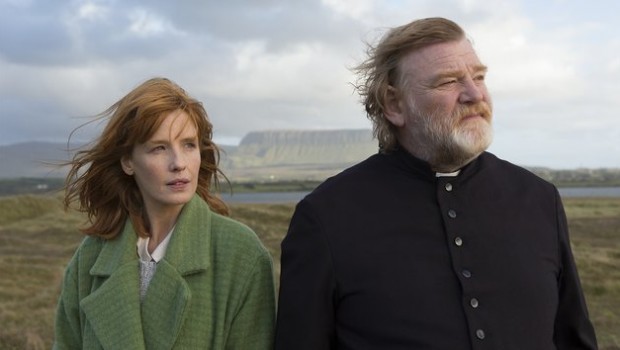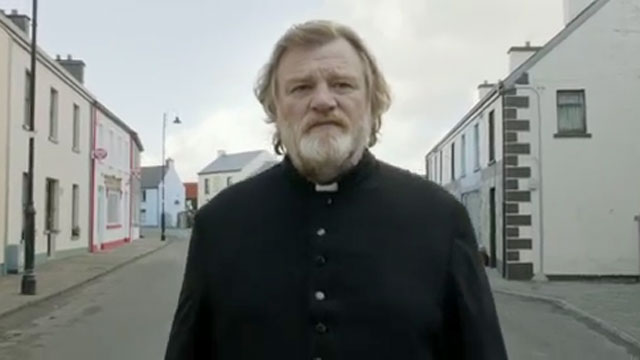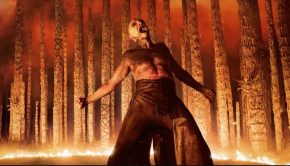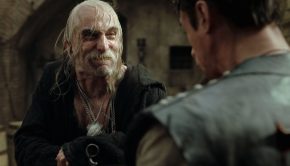Calvary – Film Review
Reviewed by Damien Straker on July 1st, 2014
Transmission presents a film by John Michael McDonagh
Produced by Chris Clark, Flora Fernandez-Marengo and James Flynn
Written by John Michael McDonagh
Starring: Brendan Gleeson, Chris O’Dowd, Kelly Reilly, Aidan Gillen and Dylan Moran
Music by: Patrick Cassidy
Cinematography: Larry Smith
Edited by: Chris Gill
Running Time: 100 minutes
Rating: MA15+
Release Date: July 3rd, 2014
There is a healthy rivalry between English filmmaker John Michael McDonagh and his brother Martin McDonagh. Martin is a playwright, who wrote and directed the popular crime films In Bruges (which co-starred Brendan Gleeson) and Seven Psychopaths. In Bruges was about a hitman who hid in Belgium after the murder of a priest. In an interview with The Independent, John said that he hated theatre and was jealous of his brother’s film success until he made The Guard, where Gleeson played a bumbling policeman. Emerging from a working class background, the brothers have become known for their sophisticated ear for dialogue. Some have compared their writing styles to Quentin Tarantino but rather than being exploitative their work is distinguished by blurring complex moral boundaries and philosophising about violent men. John’s new film Calvary is also about impending violence and grief. The name of the film refers to the crucifixion of Christ and Brendan Gleeson stars as a priest. Set in the Irish county of County Sligo where John’s mother once lived, the film continues to pose questions typical of the work of these talented brothers.
The film is being called Part Two of the “Glorified Suicide Trilogy” with a third movie already planned. As one of the few people who did not like The Guard, Calvary is a vast improvement. It is said to be influenced firstly by a drunken conversation between Gleeson and McDonagh but also Hitchcock’s I Confess. The dark humour here is funnier than it was in The Guard, but not as broad, and the narrative feels richer and deeper about what it is saying. The film’s tonal security is also ensured by casting Gleeson again and directing him to give a very measured, restrained performance that never has the slightest wink to it. Although this is a black crime-comedy, the seriousness of the story ensures that it is also empathetic towards its subject the Catholic Church. The film is tense and gripping but also resoundingly vocal about the irresolvable dilemmas faced by the church and how these conflicts are isolating the organisation from helping people.
The opening is brilliant with Father James Lavelle (Gleeson) taking a man’s confession. The scene is photographed in an unbroken, medium close-up shot so that we only see Lavelle’s reactions and not the man speaking. The man tells him that he was abused as a child and in one week’s time he is going to kill Lavelle. Some clever post-production work was used to alter the voice and hide the character’s identity. The twist is that Lavelle knows who the man is but the audience doesn’t, which sets a unique mystery in motion but also a philosophical journey. Lavelle is like a detective as he talks to the townsfolk. He investigates who hit a woman in the face and also reconciles with his suicidal daughter. His goal is not to find out who the killer is but to come to terms with death and the fact that the imbalance among people, classes, status and cultures cannot be repaired. In some ways the disembodiment of the man at the beginning of the film is like a voice in Lavelle’s own head. It is the voice of self-destruction and self-doubt inside a tortured man. He joined the priesthood and gave up drinking after his wife died. While he tries to shield himself under his cassock and also by distancing himself from the crime of the church, it is as though he is directly looking into the abyss and therefore himself when he looks at the unsalvageable townsfolk.
The clarity in the narrative and its thematic goals can be attributed to the excellent casting. Few films in recent memory have paid as much attention to its side cast as Calvary. There is an entire gallery of quirky characters here who distinctively voice powerful social questions. The strong casting also works in tangent with the clean, linear and episodic structure of McDonagh’s own screenplay, which is reminiscent of James Joyce’s novel Ulysses. Lavelle’s meetings with many of these creeps evokes questions about the wealth of the Church after the Global Financial Crisis, violence being acceptable in other cultures, gun laws and assisted suicides. I did not expect the film to touch on as many social issues and dilemmas as it does and these issues are inhabited by a great side cast including Aidan Gillen, Chris O’Dowd, Domhnall Gleeson and Kelly Reilly. Their characters belong to a world that has lost its moral core and is cynical enough to turn its actions back onto the Catholic Church itself, asking how the organisation is any different because of its own sins. For Lavelle, how does a genuinely good priest separate himself from these sins if he represents the church?
McDonagh direction favours building a sense of place and location through some superb technical feats and subtle design choices. The film looks fantastic because of the gorgeous overhead shots of the Irish geography and the waves crashing against the rocks as people surf down below. The cliff faces also assert the sense of isolation and inevitability about Lavelle’s dilemmas because he is physically and emotionally trapped. The costumes too, like Lavette’s cassock, are photographed hanging up like a uniform that blankets him from other people but are also a symbol of his own repression as he hides his own violent impulses. Similarly, there are subtle framing techniques that reflect ideas about the characters such as Lavelle and his daughter being photographed on opposite sides of the frame to express their emotional distance. As Lavelle, Brendan Gleeson gives one of his best performances to date, which is unusually quiet but also imposing with authority, reflecting the contrast between his reserved side and his uglier nature. Colourfully written and sometimes bizarre, I found Calvary to be fascinating and crafted with skill and a purposeful mind.
Summary: Colourfully written and sometimes bizarre, I found Calvary to be fascinating and crafted with skill and a purposeful mind.









